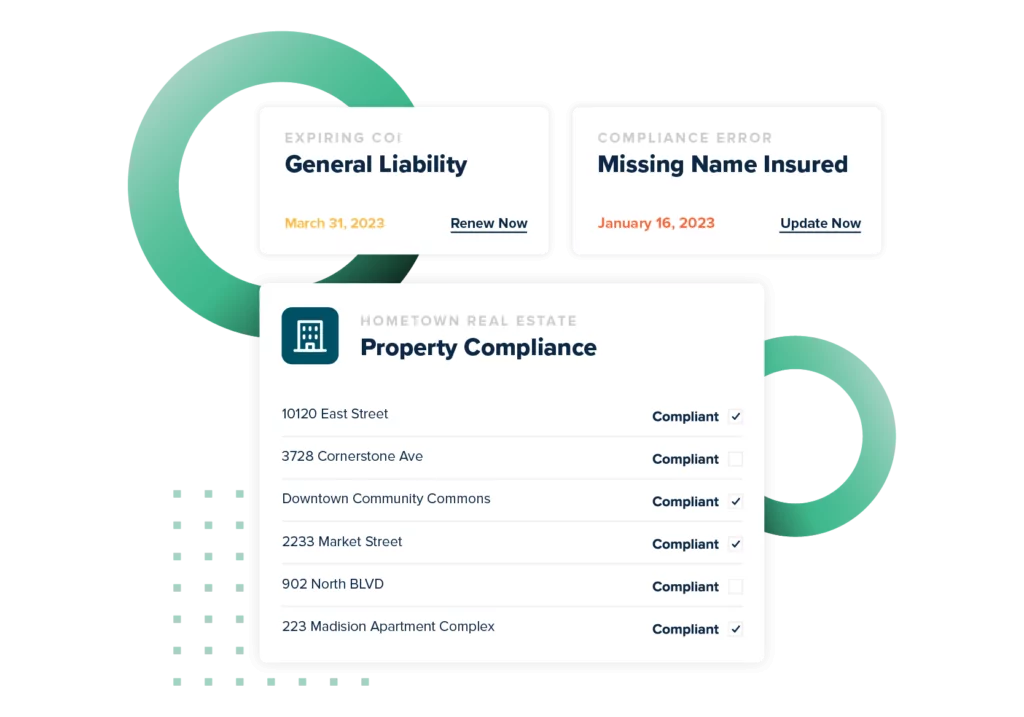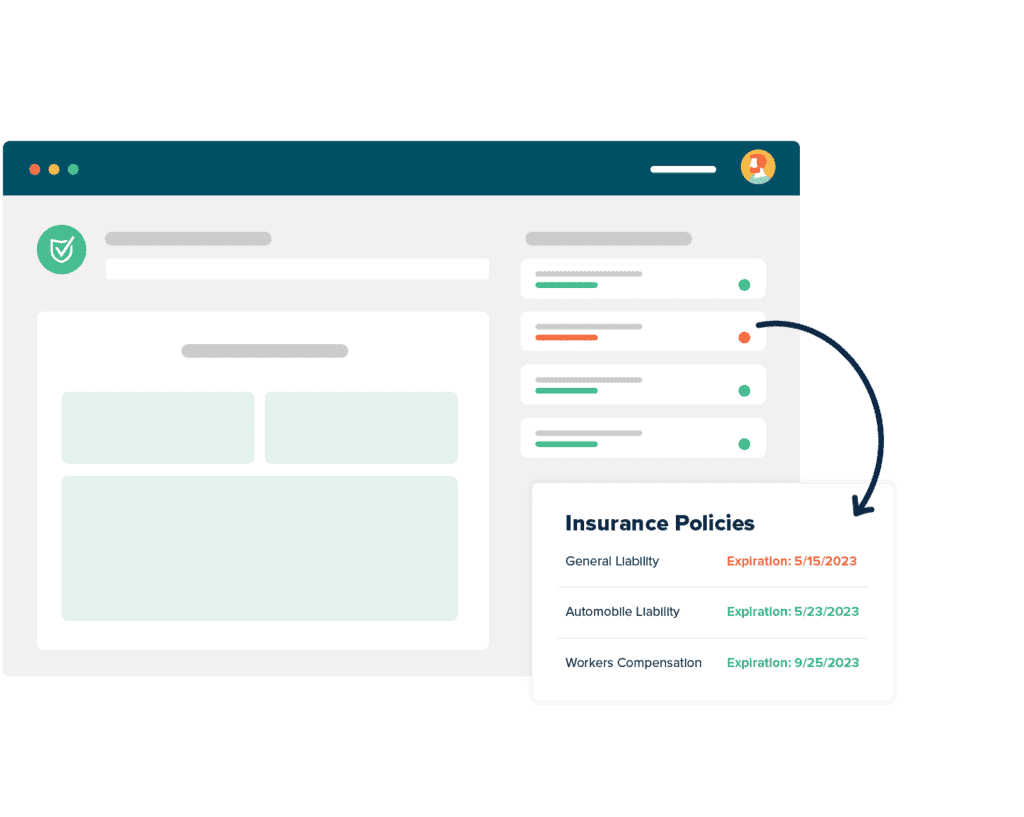Best Certificate of Insurance Tracking Software

Protect Your Business From Costly Claims
Ask your CFO or Risk Manager just how much claims and lawsuits can cost your business. If you are collecting certificates just to confirm they were received, you have no guarantee that your requirements are being met. myCOI Central is built on a foundation of insurance industry logic to ensure you remain protected with the appropriate coverage.
Automate Your COI Tracking
There’s no more need to worry about stacks of certificates cluttering up your office or hours of frustrating phone calls and emails to chase down certificates. myCOI Central provides your company with a solution to automate your insurance certificate requests, collection, and compliance resolution, while also giving your team a single, centralized repository to view compliance.


For Agents & Brokers
Win business and boost retention by providing agency branded, industry leading insurance tracking software to your insureds. Offer software only or add on your own compliance review services.
What Are The Benefits of COI Software?
View all CasesWorkers Comp Certificates
Most of us know what a workers comp certificate is, but let’s cover the basics again just in case. Valid workers’ compensation certification is proof that a business carries workers’ comp coverage. Workers compensation certificates are issued by the insurer at the request of an organization that seeks to confirm that the business is covered. In the same way that you, as the business owner, need to ensure that your business and your employees are covered, so does any business that hires you.
Many businesses are legally required to carry worker’s compensation coverage for their employees. Each state in the United States regulates worker’s compensation coverage under its own laws, which means the potential penalties, fines, and even periods of imprisonment vary.
There are exceptions to the need for workers’ compensation certification, but they are unique to each state. Know the laws in your state. Protect yourself and your employees.
For example, in Indiana, the Indiana Department of Revenue issues a Worker’s Compensation Exemption Certificate Clearance to individual taxpayers who are independent contractors or otherwise not required to carry worker’s compensation insurance on themselves under the Worker’s Compensation Act of Indiana. Persons and/or businesses that qualify for such exemption are issued forms that act as a workers comp exemption letter.
Whether you’re self-employed, a small business owner, or even on the other side as a compliance admin for a large company, workers comp is a complicated, but necessary, process to work through.
Workers Comp Exemption Certificate
We said above, and it’s true, that almost every form of business is legally required to hold workers compensation coverage. We also said there are exceptions for single-employee or sole proprietorships in many states. And even though we said it, and it’s true, it’s still a little confusing. Let’s look again at what a workers’ comp exemption certificate would look like.
If you’re a sole proprietor, you can often choose whether or not to carry standard workers comp coverage on yourself, whether to carry a ghost policy, or not carry any coverage. Each of those options has pros and cons. Not carrying coverage is certainly cheaper—unless you get hurt. In that circumstance, carrying workers compensation for yourself, despite the expense, can help defray the cost of your medical bills.
You might find it useful to look at your local certificate of insurance example PDF and see what it says. They’re pretty easy to find with a web search, just put in something like “workers comp exempt form ny” or “workers comp exemption sole proprietorship Florida.” You can usually find what you need in the first couple results, and looking at those will help you figure out what keeps yours from looking like a fake workers comp certificate.
And don’t forget, especially if you’re a subcontractor who works for a lot of general contractors: sometimes the GC will require you to have coverage, no matter what the law says.
Sample Workers Comp Certificate
Let’s pretend you’re a new compliance admin who’s just received a worker’s compensation certificate of insurance (COI). Do you know what you’re looking for? Do you know which boxes on the form are the important ones? It’s okay if you don’t: let’s talk about some of the high points. There’s a lot riding on making sure this COI covers both what the contractor says it does, and that the coverage is what your own company expects of those you do business with.
One of the most common sample workers comp certificate of insurance samples is the common ACORD-25 liability form.
The ACORD 25 is a basic workers comp certificate example. It records and identifies the contractual agreements between the insurer and the insured. Put another way, it helps you know which policies, protections, exemptions and provisions your potential new contractor is carrying.
This form is pretty self-explanatory: the fields and boxes are pretty well labeled, but let’s go through the high points. At the top you’ll have boxes for producer and insured; make sure your contractor is listed in the insured box!
The coverages boxes are where the details are recorded, with fields like general liability, automobile liability, garage liability, excess or umbrella coverage, and finally what we’re here to talk about: workers compensation and employers’ liability. Check the information in these boxes carefully against your company’s requirements. If they don’t line up, then you’ll need to have the contractors adjust their coverage.
Or find a new contractor.
There are a limited number of cases where a subcontractor may present you with a workers comp exclusion form instead. No matter what you end up needing, you can always find examples online with simple searches like ‘ohio workers’ comp certificate’.
Workers Comp Certificate Florida
Let’s look at Florida as a case study. For questions about workers comp certificate Florida maintains a fairly robust site you can find by doing a Florida workers’ compensation case search. Like any other state, Florida maintains its own laws and practices, and you need to ensure you’re compliant, but for proof of workers’ compensation Florida uses the same certificate as other states.
If you suspect you may not be required to show proof of workers’ compensation Florida offers the following statement: In order to apply for or renew an exemption from workers’ compensation law, the exemption applicant must complete and submit a Notice of Election to be Exempt application online to the Florida Division of Workers’ Compensation.
According to the National Federation of Independent Business, in Florida “Construction businesses with one or more employees and non-construction industry employers with four or more employees (full-time or part-time, including corporate officers and LLC members) must carry coverage.” Florida workers’ compensation exemption for non construction workers is adjudicated by the state: you need to file the paperwork and get cleared before you risk not carrying protection.
Workers’ Compensation Certificates Of Insurance For Subcontractors
Workers compensation and subcontractors sometimes gets complicated. Many states make statements like this one from Indiana: individual taxpayers who are independent contractors or otherwise not required to carry worker’s compensation insurance on themselves under the Worker’s Compensation Act of Indiana. But there’s a lot of room around the edges of a statement like that.
Even with that, almost every governing body or advisory body will suggest that you request workers’ compensation certificates of insurance for subcontractors who do business with you. It’s just good practice. Despite not being required, many subcontractors and independent contractors will carry the requisite insurance, and connect you with their agent to request the certificate of workers’ compensation insurance. You can find examples of what this looks like by searching for ‘acord certificate of insurance 2020’, or by searching for a workers comp exemption form pdf.
You may even get a ghost policy, and no: that’s not a joke. Self-employed individuals with no other employees often carry a policy that excludes them, which gives them workers’ comp with no employees.
That may not seem like it makes any sense, and at first glance it doesn’t, but let’s look at it in more detail.
Ghost Policy Workers’ Comp Definition
The so-called ghost policy workers comp definition is pretty simple, and it translates to workers’ comp with no employees. A single-person business, such as a subcontractor who works regularly with a general contractor, buys an affordable workers compensation policy. But here’s where the ghost part comes in: the policy excludes the business owner, so it doesn’t cover anyone. The running joke is that it protects a ghost that follows the subcontractor around.
Why do these subcontractors do this? The simple answer is that general contracting company they always work with probably requires it. Whether or not the policy is actually providing any real protection to anyone (except the ghost) is a conversation for another day. An actual workers comp ghost policy cost can be pretty low.
Many states allow these kinds of policies. Just like above, you find them with quick web searches for things like “workers comp ghost policy Missouri” or “workers comp ghost policy va”.
Even so, holders of ghost policies are often audited, and if the auditor discovers that the policy holder’s eligibility lapsed, the fines can be hefty. That’s why the cheapest workers comp ghost policy may not be the best.
Workers’ Compensation Certification
There is one other class of person interested in workers’ compensation certification: the workers compensation claims adjuster. These adjusters are certified by states like California with either WCCA certification or WCCP certification and are empowered to adjudicate claims.
There are many organizations that offer workers’ comp certification training, such as the Insurance Education Association (IEA). They traditionally offer certificate or designation training. According to IEA:
The California Workers Compensation Claims Administration (WCCA) and California Workers Compensation Claims Professional (WCCP) programs of The Institutes are the gold standard professional credentials in the industry. Some 8,000 California workers’ compensation professionals have earned the WCCA certificate, while almost 3,000 have gone on to attain the WCCP designation.
If you’re interested in learning more about workers’ compensation claims training programs, just search online for “workers’ compensation certification program california.”
Proof Of Workers’ Compensation Coverage
If you’re a compliance admin, getting proof of workers compensation coverage is a core part of what you do. Usually it’s very simple: contractors will provide their own COIs, and will have done the work to make sure they’re compliant with your rules. You can just check the boxes and the coverages and move on.
But you do have to check. Just having proof of coverage insurance doesn’t mean a contractor is compliant. Sometimes you have to verify or request changes in coverage. Usually you can deal directly with an insured’s insurer to make verifications of coverage amounts, exceptions and limitations.
If you’re a contractor asking ‘how do I get a copy of my workers’ comp certificate,’ well, you just ask for it, from your insurer. Proof of workers’ compensation insurance is something you’re going to want to have handy, and getting your copy of workers’ compensation certificate is just a smart move.
Plus, imagine you’re bidding a job against a competitor who doesn’t know how to get a workers’ comp certificate; you’re going to look more prepared, and that’s never a bad thing.
Always remember, businesses and contractors are responsible for their own coverage. Don’t be afraid to make them pursue their own compliance before you work with them.